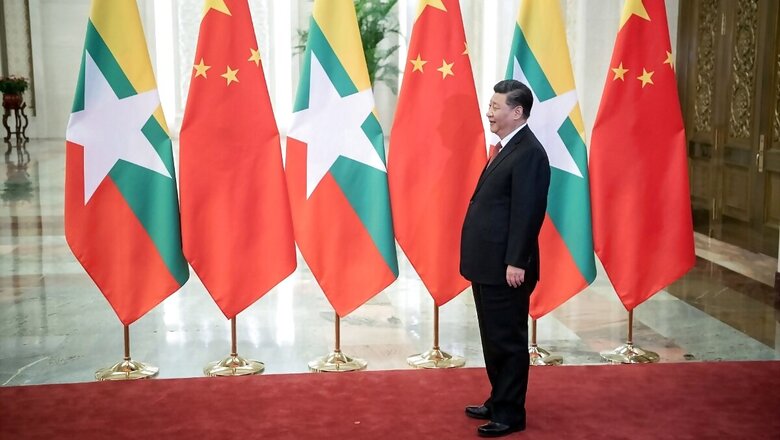
views
The bilateral trade between Myanmar and China in 2010 was US$1.22 billion. China’s share in Myanmar’s imports was 19.81%, while it accounted for just 2.93% of Myanmar’s exports. Back then, Thailand was the biggest trading partner with US$3.65 billion in bilateral trade. But it was largely export driven with 35.83% share of Myanmar’s total exports, while Singapore was at number three with US$1.58 billion of bilateral trade, according to the World Bank data.
India’s bilateral trade with Myanmar stood at US$1.12 billion and it was largely import driven. Myanmar’s import share with India was just 3.32%, while India’s share in Myanmar’s export was 10.80%.
Xi Jinping was made the General Secretary of the Chinese Communist Party in November 2012 as well as the Chairman of the Central Military Commission. In March 2013, he was declared the next Chinese President. The year 2013 saw China becoming the top trading partner of Myanmar replacing Thailand. The bilateral trade reached US$6.71 billion. China was Myanmar’s biggest exporter with 30.50% share in Myanmar’s total imports and second biggest importer of Myanmar’s exports at 26.70%, behind Thailand’s 40.21%. Thailand was the second biggest partner with US$5.6 billion in bilateral trade, while Singapore-Myanmar bilateral trade was at US$2.93 billion.
At this time, India’ bilateral trade was more or less limited to 2010 trade figures, at US$1.18 billion.
It was the beginning of the phase that could one day see Myanmar finally capitulating to China.
Unlike Thailand, China’s trade with Myanmar was both import and export driven, with China gradually becoming Myanmar’s sole market for imports and exports.
Xi Jinping quoted a Myanmarese saying in 2013 that China will ‘lift all the boats’ in the region, but his real intention was to push China deep into Myanmar by involving Chinese enterprises in Myanmar’s national construction efforts. His message to visiting Myanmar President U Thein Sein was a clear indication.
In 2018, by the time Xi Jinping began his second term as the Chinese President, China’s grip on the Myanmar economy had tightened even more. The import and export trade figures reached US$11.78 billion, more than twice that of Thailand’s bilateral trade with Myanmar at US$5.65 billion. It crossed the US$17 billion mark in 2019.
While China was rapidly making inroads into Myanmar, Indian economic presence in Myanmar has been, more or less, limited to the 2010 trade statistics level — a bilateral trade over 11 times smaller than China, according to estimates.
In January 2020, when Xi Jinping visited Myanmar, the first Chinese leader in 19 years, to mark 70 years of diplomatic relations between China and Myanmar, he quoted the Five Principles of Peaceful Coexistence signed in 1954.
The Five Principles of Peaceful Coexistence or Panchsheel Policy was signed separately between India and China and Myanmar and China with the broad emphasis on mutual respect for sovereignty and territorial integrity, mutual non-aggression, non-interference in each other’s internal affairs, equality and mutual benefit and peaceful coexistence.
But China betrayed India after signing this principle. While India has followed Panchsheel Policy on Tibet being part of China, China doesn’t recognise Ladakh and Arunachal Pradesh as parts of India and forced a war on India in 1962. While Panchsheel talks about respecting territorial integrity, China says it doesn’t recognise the Line of Actual Control (LAC) between India and China.
And Myanmar, it seems, is going to have the same fate.
Myanmar’s top leaders visit China regularly while China’s top leaders rarely visit Myanmar. The country is falling into Chinese debt trap with China accounting for 40% of the national debt. The huge Chinese investments in Myanmar, worth US$21.5 billion so far, comes with recent loans of a higher interest rate of 4.5%, much above the interest rate charged by agencies like the World Bank and the IMF. Myanmar, a country with a GDP of US$76 billion, pays China annually US$500 million for its loan repayment.
And it has no other option but to look up to China when it comes to defend its position on Rohingya Muslim issue or the recent military coup. Beijing has fully backed Myanmar in the face of mounting international pressure on the Rohingya issue that forced hundreds of thousands of Rohingya Muslims to flee Myanmar. China has also blocked the UN condemnation of the military coup.
And, in bargain, China is extracting its price, expanding its presence in Myanmar.
Read all the Latest News, Breaking News and Coronavirus News here




















Comments
0 comment